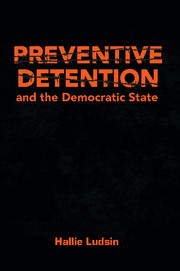Book contents
- Frontmatter
- Contents
- Acknowledgements
- List of Acronyms and Abbreviations
- Introduction
- 1 The Theoretical Framework
- 2 The Policy Debates
- 3 Preventive Detention under International Law
- 4 The History of Preventive Detention in India
- 5 India's Current Preventive Detention Legislation
- 6 India: Preventive Detention and Due Process
- 7 India: The Risk Society and the Slippery Slope
- 8 Preventive Detention in England
- 9 England: Preventive Detention and Due Process
- 10 Preventive Detention in the United States
- 11 The United States: Preventive Detention and Procedural Due Process
- 12 Preventive Detention's Slippery Slope
- 13 Preventive Detention and Liberal Democracy
- Index
3 - Preventive Detention under International Law
Published online by Cambridge University Press: 05 March 2016
- Frontmatter
- Contents
- Acknowledgements
- List of Acronyms and Abbreviations
- Introduction
- 1 The Theoretical Framework
- 2 The Policy Debates
- 3 Preventive Detention under International Law
- 4 The History of Preventive Detention in India
- 5 India's Current Preventive Detention Legislation
- 6 India: Preventive Detention and Due Process
- 7 India: The Risk Society and the Slippery Slope
- 8 Preventive Detention in England
- 9 England: Preventive Detention and Due Process
- 10 Preventive Detention in the United States
- 11 The United States: Preventive Detention and Procedural Due Process
- 12 Preventive Detention's Slippery Slope
- 13 Preventive Detention and Liberal Democracy
- Index
Summary
International law offers at least some answers to the policy issues raised in Chapter 2. Its role is to place limits on state power using human rights norms. These limitations on detention powers provide minimum benchmarks for assessing whether preventive detention is legitimate or constitutes arbitrary detention. These limitations, however, do little to check the state's power to create new preventive detention regimes; they focus more on protecting procedural rights than ensuring that preventive detention remains an extraordinary measure to be used in extraordinary circumstances. Because of this, international law fails to create the safety net necessary to protect against the slippery slope of preventive detention feared here.
Chapter 3 begins by listing the sources of international law that govern preventive detention. It then examines whether international law places any restrictions on the types of harm states can seek to prevent, focusing on whether states are entitled to order detention against national security threats or for protective purposes. The chapter next considers detention jurisdiction to see whether international law offers any guidance on how states can identify detainees, who should be responsible for ordering detention and the type of law that governs. It also examines the extent of due process rights international law requires governments to guarantee detainees and how it defines indeterminate detention. Finally, the chapter describes any other rights offered to detainees and identifies any gaps in international law that could harm detainees. Overall, this chapter shows that international law is surprisingly permissive in allowing for preventive detention.
Sources of international law
International human rights law (IHRL) and international humanitarian law (IHL) are the two branches of international law that govern preventive detention. IHRL applies to all preventive detention; IHL applies only during an armed conflict. Within IHRL, the Universal Declaration of Human Rights (UDHR) and the International Covenant on Civil and Political Rights (ICCPR) are the primary authoritative sources of law on preventive detention. Human Rights Committee comments and communications, the Body of Principles for the Protection of All Persons under Any Form of Detention or Imprisonment (“Detention Principles”) and the Principles for the Protection of Persons with Mental Illness and the Improvement of Mental Health Care (“Mental Illness Principles”) constitutes of sources of law that, while not binding, are considered persuasive authority by the international community.
During any armed conflict, the four Geneva Conventions are the primary sources of IHL that govern preventive detention.
- Type
- Chapter
- Information
- Preventive Detention and the Democratic State , pp. 62 - 83Publisher: Cambridge University PressPrint publication year: 2016
- 1
- Cited by



